May 10, 2022
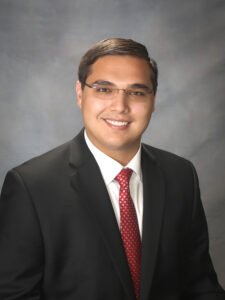
2021-2022 Precious Blood Volunteer, Aaron Wise
By Aaron Wise, Precious Blood Volunteer
I called her name. She rose slowly from her chair in the waiting room and hobbled toward me. She gifted me an enthusiastic greeting and a labored smile, that which is socially expected for decency. We entered the exam room, and I initiated the pre-provider tasks: taking vitals, gathering medical and family histories, conducting necessary point-of-care testing, etc.
Something appeared off.
Clearly, something deeper ailed my patient. I asked about her day, her holiday plans, her family. I found out the upcoming Thanksgiving would be difficult for her—the first one since losing her daughter. I asked about her daughter. I experienced my sister in Christ’s delight in sharing the memories of someone she loved so dearly. She showed me a beautiful, goofy video of her with her daughter—singing, dancing, and laughing. She teared up, a paradoxical moment of sadness and joy. Her heart was broken; from it oozed the Precious Blood, a combination of both suffering and pure love.
***************
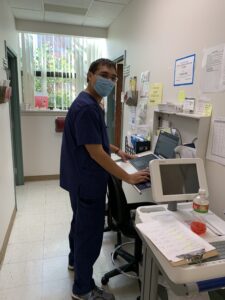
Aaron Wise, at work at KC CARE Health Center
Small drops of blood discolored the white floor. The patient had stepped on a nail in his garage, leaving a small, deep hole in his foot. I cleaned and wrapped the wound, yet this man had little concern for his foot.
He feared for his mind. He told me he wasn’t right—that something was wrong with his brain, that he was “messed up” in the head. He told me he’d done many drugs and other substances. He’d seen psychiatrists and been given many medications meant to help. None of them worked. He told me he would try one more thing, and if that didn’t work, he had “other arrangements” to take care of it.
I don’t know what this man has been through in the past. I don’t know what he is going through in the present. But I do know the life of my brother in Christ means something. He has an indelible dignity, despite the ways in which the world, those around him and he, himself, asserts that he is “messed up.”
***************
It was 2:30 on a warm Saturday afternoon. I was driving home with two friends along Independence Avenue, a busy road in Northeast Kansas City. On a patch of grass between the sidewalk and the road was a body—just yards from my residence.
I didn’t see it initially, but my friend insisted we return to check. People walked along the sidewalk, past the body. Several cars passed. From a distance, I got a better view of the man. His hat was thrown to the side, his body disheveled and uncomfortably positioned. One arm was raised and yellow. It was clear my brother in Christ was not breathing.
As we approached, a lady called out from a car to inform us she had called 911. Later, she revealed she had driven by 20 minutes prior, on a delivery. She was appalled by the indifference of hundreds of people who must have witnessed a man unwell on the side of the road. A life had passed—and nobody cared to notice.
***************
thud, thud, thud, thud, thud! It was midnight. I awoke to a cacophonous banging on our door and windows. We answered. Our neighbor frantically reported the house next to ours was on fire. We raced to the other window to witness the entire west side of the building engulfed in flames.
***************
These are but four brief stories among hundreds I’ve experienced working at the KC CARE Health Center in midtown and living in Northeast Kansas City. Interestingly, a few similar connections underly each of these stories and the many others that remain untold.
First, socioeconomic and racial barriers underpin each situation—access to health care, racism and discrimination, mental health stigmas, or scummy landlords who neglect their responsibility to respond to electrical issues. These injustices fall harder on minorities and those with less money.
Second, suffering seems to be part of the human condition. There is nothing the individuals in these stories could have done to prevent their hardship. I don’t say this ignoring the role of free will. Yes, each individual may have made choices that contributed to their situations, but the options they had available were severely screened by culture and society, among several other determinants.
Finally, God is present deeply with those who suffer. These are truths we recognize profoundly in the spirituality of the Precious Blood.
CS Lewis affirmed that heaven is an acquired taste. Jesus is my savior, and it is by His doings—not my own—that I will experience eternal life in union with God. Yet, if you were to bring me to heaven right now, I do not know if I’d like it. I still carry the taste of the world with me: pride, independence, self-servitude, sin. This contrasts with the purity and fullness of love that is heaven. However, through service and the experiences like those shared above, I’ve begun to acquire the taste of Christ. Community, simplicity, and prayer also have been formative for me during the past year.
I’ve practiced community on two levels this year: directly with those with whom I live and also with the global community.
I live with 18 others, including two families with five children, and sharing life with them has been a beautiful joy. I experience this joy in the form of sharing meals, interests, events, and time. I have countless jubilant memories such as tennis, basketball, soccer, football, Frisbee, ice skating (I love sports), faith sharing, music, etc.
In terms of the wider community, we focus on conservation, being involved in neighborhood and city policies, and living on a smaller income. Some of the practical aspects of this lifestyle are eating a vegetarian diet, consuming less water and electricity, composting, using a clothesline, paying attention to consumables and reusing when appropriate, and purchasing natural organic local products when available. There is a richness to sharing resources and life in this way.
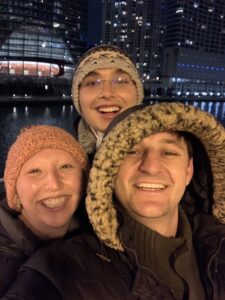
Aaron with his fellow Precious Blood Volunteers in Chicago
Simplicity is a challenging ideal when we live in a chaotic world. Despite this, I still have been able to find simplicity relative to my previous student lifestyle. I live in a house without Wi-Fi and a phone signal because I strive to remove unnecessary and empty lifestyle choices. Often when we think about simplicity, we focus on what we “give up” and an image of emptiness is invoked. In practice, it is quite the opposite! Removing the superficial and unimportant gives way to a spirit of great abundance—especially in time, relationships and charity.
Finally, prayer is the cornerstone that links everything. My relationship with God has strengthened me to participate and grow in all the ways discussed and also has been strengthened through my experiences. Daily Mass is a joyous gift and receiving the Eucharist has been fuller and more transformative through walking with others as a Precious Blood volunteer.
This year has been formative as I’ve taken little steps along a lifelong journey to acquire the taste of heaven. I invite all of you to join in along the way. As echoed at Jerusalem Farm: The way is long, let us walk together; the way is hard, let us help one another; the way is Christ, Christ is the way.
Aaron served as a Precious Blood Volunteer at KC CARE Health Center in Kansas City, Missouri. Go to preciousbloodvolunteers.org to learn more about Precious Blood Volunteers.
Apr 4, 2022
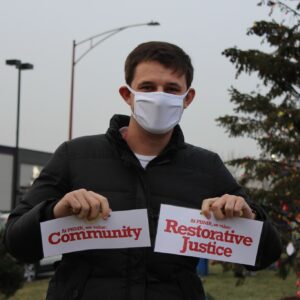 by Vincent Tedford, Precious Blood Volunteer
by Vincent Tedford, Precious Blood Volunteer
Last year, I was meditating on Christ’s Passion. Christ’s sacrifice and suffering were a focal point for all my emotions surrounding the injustices I witnessed in the world around me. Nothing else evoked the same emotion for me. However, when I became a Precious Blood Volunteer, I witnessed human suffering on a scale like never before.
In August of last year, I moved to Chicago’s Back of the Yards neighborhood to begin volunteering at the Precious Blood Ministry of Reconciliation (PBMR). Within a few hours of landing, I met and heard the stories of those wrongfully convicted and/or formerly incarcerated, the victims of gun violence, the medically underserved, and generally marginalized people with whom I would be spending my year as a Precious Blood Volunteer. I thought I knew what I was getting into, but even on day one I was surprised at the reality our PBMR community was facing.
Death and loss are in constant competition against the backdrop of hope we try to maintain at PBMR. In the forefront were the daily struggles. I went to the woodshop and worked with guys trying to make enough to get by while learning what it takes to maintain a job; showing up and staying on task often prove to be a struggle for our participants. Early on I was enlightened by the question, “How can you meet basic expectations when your basic needs are lacking?”
“I don’t have a bed. My family is taking in people all the time and I gave mine up for my brother. He’s in high school, playing sports, so I want him to have the best shot at success.” One of our participants shared this with me while talking about his own journey to a career as an athlete. This young man is willing to make sacrifices, despite the drain on his own potential, for someone else to get a leg up he never had. Something as simple as a good night’s sleep should never be taken for granted.

Vincent (front right) with his fellow Precious Blood Volunteers in Chicago
For some, the threat of violence keeps them up at night; most are experiencing perpetual trauma which would make anyone restless. Just trying to get by, living each day on high alert, and/or self-medicating are enough cause for them to fall behind. Every day at PBMR I have seen elements of this cycle in people’s lives.
I am reflecting on my life before August and how the time since then has impacted and will continue to impact me going forward. Before graduating last May, I had no image more viscerally compelling to meditate on than the Passion. Now, while I walk the streets of Back of the Yards on my way to PBMR, I feel an intense emotion being evoked.
As I take the bus to my meetings and appointments, or towards my leisure activities and outings, the reality of human suffering is present and inescapable. I realize now my life was sheltered from this pain; my vision—even though imagining the Passion was important—was limited to this far-off concept of despair. Having been drawn near to my heart through my experience, the people of the PBMR community have shown me how I must go forth in spirit to my future.
When I go to the EdLab, our room for tutoring those trying to go back and get their high school diploma, I prepare myself to encounter the students wherever their minds are. Some days I know there is nothing I can do to help someone in or out of the classroom. On others, I feel the slightest gift makes a big difference. The common factor, though, is showing up and accompanying.
When I was told that the core of this program was to walk with those who suffer, I merely drew upon my experience sitting with people in pain. Now, even though I do often sit next to students to tutor, being seated speaks nothing to the difficulty of the walk we take. The walk they must take every day and to which I merely opt-in.
One student tested my proverbial ability to walk. I often hear incoherent stories of their life and I witness their unstable condition, both physically and mentally. They often challenge my ability to respond with compassion. Accompaniment, I learned, can mean frequent stopping for breaks and reminding someone to take a breather while you keep watch for them.
One day in the EdLab, I was grading papers and supervising students while they studied. A student was talking to themselves and getting louder. I asked if they were okay which they promptly brushed off. Thankfully, one of the religious sisters had reflected on these situations for years and helped me respond. “Hey, you’re doing some great work today. I can tell you have a lot on your mind, so how about we take a break and get some water? Let me know if you want to talk, okay?”
I learned through moments like this: the little bit of discomfort I would have during an interaction with someone during bouts of schizophrenia could be pivotal to their educational progress and more importantly, demonstrate compassionately how they are a part of our community not to be neglected.
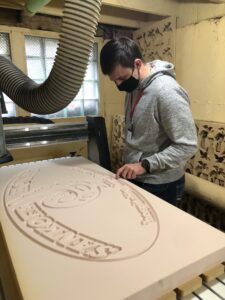
Vincent checking the quality of a piece in the PBMR wood shop
I want to keep sharing my skills with my community. Someone once said, if you want to change the world, go home and love your family. From there, serve your community, and keep carrying that out across the global community we all share. For now, my roommates and I take care of our home together and share our experiences at PBMR while supporting, reaffirming, and imparting wisdom to each other. I’m grateful to Missionaries of the Precious Blood, who support me during this year of service, the people looking out for me and my fellow volunteers, and the PBMR community, who appreciate the gifts and talents I bring.
The liberty of our communities at large is bound to the liberty of each community. Wherever I go, no matter what I do, I now know my liberty is bound to my neighbors and we can work together. Marginalized, far-off, and/or rejected, you carry within you the same Precious Blood we all share.
Vincent is serving as a Precious Blood Volunteer at Precious Blood Ministry of Reconciliation in Chicago, Illinois. Go to preciousbloodvolunteers.org to learn more about Precious Blood Volunteers.
Apr 2, 2022
Reflections from the 2021-2022 Precious Blood Volunteers
Abundance Fills the Soul When Excess Is Stripped Away
May 10, 2022

2021-2022 Precious Blood Volunteer, Aaron Wise
By Aaron Wise, Precious Blood Volunteer
I called her name. She rose slowly from her chair in the waiting room and hobbled toward me. She gifted me an enthusiastic greeting and a labored smile, that which is socially expected for decency. We entered the exam room, and I initiated the pre-provider tasks: taking vitals, gathering medical and family histories, conducting necessary point-of-care testing, etc.
Something appeared off.
Clearly, something deeper ailed my patient. I asked about her day, her holiday plans, her family. I found out the upcoming Thanksgiving would be difficult for her—the first one since losing her daughter. I asked about her daughter. I experienced my sister in Christ’s delight in sharing the memories of someone she loved so dearly. She showed me a beautiful, goofy video of her with her daughter—singing, dancing, and laughing. She teared up, a paradoxical moment of sadness and joy. Her heart was broken; from it oozed the Precious Blood, a combination of both suffering and pure love.
Read more of Aaron’s reflection at https://preciousbloodkc.org/abundance-fills-the-soul-when-excess-is-stripped-away/
Accompaniment
Apr 4, 2022
 by Vincent Tedford, Precious Blood Volunteer
by Vincent Tedford, Precious Blood Volunteer
Last year, I was meditating on Christ’s Passion. Christ’s sacrifice and suffering were a focal point for all my emotions surrounding the injustices I witnessed in the world around me. Nothing else evoked the same emotion for me. However, when I became a Precious Blood Volunteer, I witnessed human suffering on a scale like never before.
In August of last year, I moved to Chicago’s Back of the Yards neighborhood to begin volunteering at the Precious Blood Ministry of Reconciliation (PBMR). Within a few hours of landing, I met and heard the stories of those wrongfully convicted and/or formerly incarcerated, the victims of gun violence, the medically underserved, and generally marginalized people with whom I would be spending my year as a Precious Blood Volunteer. I thought I knew what I was getting into, but even on day one I was surprised at the reality our PBMR community was facing.
Read more of Vincent’s reflection at https://preciousbloodkc.org/accompaniment-2/
Receiving Welcome
Feb 1, 2022
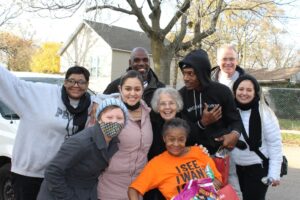
Raechel with members of the PBMR community
By Raechel Kiesel, Precious Blood Volunteer
One sunny Sunday in December, I found myself in the PBMR hallway watching my friend Essie teach the niece of one of the moms in our Families Forward program how to play a clapping game. It was similar to many of the patty-cake-like games I played as a little kid, but it wasn’t one I had seen before, so I soon turned to Sr. Carolyn, and we tried to clap along with Essie and our new friend. After many rounds of trying and failing, I ended up playing with the young girl. We had both improved just a little, so soon enough we were shouting together, “Right! Left! 1 Right! Left! 1 2 Right! Left! 1 2 3!” and clapping faster and faster, and when we finally made it to 5—which was a major feat, let me tell you—we jumped up and down and cheered. It was then that I remember watching out of the side of my eye as Fr. Kelly walked past us, narrowly avoiding contact with our flailing, clapping limbs, and I realized just how ridiculous I looked at that moment. Not only did I have reindeer antlers on my head, but I had been bent over playing patty cake with a little girl, laughing, shouting, raucous, and happy, in the middle of the hallway on a Sunday. It took me a while after that to realize that, actually, it wasn’t ridiculous at all—not for PBMR. Because that’s what we do here.
Read more of Raechel’s reflection at https://preciousbloodkc.org/receiving-welcome/
Learn more about Precious Blood Volunteers at preciousbloodvolunteers.org.
Feb 1, 2022

Raechel with members of the PBMR community
By Raechel Kiesel, Precious Blood Volunteer
One sunny Sunday in December, I found myself in the PBMR hallway watching my friend Essie teach the niece of one of the moms in our Families Forward program how to play a clapping game. It was similar to many of the patty-cake-like games I played as a little kid, but it wasn’t one I had seen before, so I soon turned to Sr. Carolyn, and we tried to clap along with Essie and our new friend. After many rounds of trying and failing, I ended up playing with the young girl. We had both improved just a little, so soon enough we were shouting together, “Right! Left! 1 Right! Left! 1 2 Right! Left! 1 2 3!” and clapping faster and faster, and when we finally made it to 5—which was a major feat, let me tell you—we jumped up and down and cheered. It was then that I remember watching out of the side of my eye as Fr. Kelly walked past us, narrowly avoiding contact with our flailing, clapping limbs, and I realized just how ridiculous I looked at that moment. Not only did I have reindeer antlers on my head, but I had been bent over playing patty cake with a little girl, laughing, shouting, raucous, and happy, in the middle of the hallway on a Sunday. It took me a while after that to realize that, actually, it wasn’t ridiculous at all—not for PBMR. Because that’s what we do here.
Only a month before that, I had been asking Sr. Donna if I could come to the first in-person mothers circle since covid had rendered them virtual. And when I found out that my parents would be visiting that weekend, I asked if my own mom could come too. Of course, she said, “Oh yeah, that would be great!” So that Sunday morning, I sent my dad with my brother to explore the city, and my mom and I went to PBMR. We were one of the first ones there, and still we looked at Sr. Donna and said, “Are you sure that it’s okay if we’re here?” We were feeling the discomfort. As two white women, strangers to gun violence and the grief of having lost a child, we were hyper aware of entering a space that did not belong to us—and yet we were invited in. So we made our name tags, pretended like we were comfortable, and we sat next to each other as the rest of the circle filled with beautiful women from around the neighborhood.
I didn’t expect to have much to share. Here at PBMR, we sit in circle for staff meetings each week, and by that point I had a pattern. Even coming here, I knew that as a white woman, I had so much I needed to learn. So I had decided early on that my primary role was to listen. Which isn’t something I’ve often told myself—to be humbled and value others’ voices over my own.
But in the mothers’ circle that day, when the talking piece got to me, I told a story about losing my grandmother, and the beauty that I got to witness in her final days among my family, how important that was to me. Looking around the circle as I was speaking and teary-eyed, and then as my mom spoke after me, the other women were nodding. They looked at us with faces that knew loss deeply, even the loss that we had felt, losing my grandma, my mom losing her mom. That stood out to me. They didn’t have to let some white girl walk into their circle and try to say something about grief, but they did. Not only that, they listened and encouraged me, and I felt so welcome and loved in a space I didn’t know could be my own.
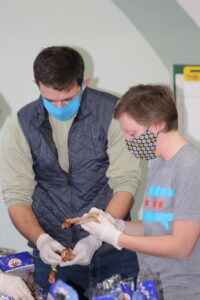
Raechel with fellow Precious Blood Volunteer, Vincent, at PBMR
Jacquelyn Grant, a womanist theologian, makes the case that God is a Black woman and, in fact, manifested “in the community of Black women” (Grant, Jacquelyn. “The Challenge of the Darker Sister.” White Women’s Christ & Black Women’s Jesus, Scholars Press, 1989). In the experience of ancestral Black women, she writes, “They identified with Jesus because they believed that Jesus identified with them. As Jesus was persecuted and made to suffer undeservedly, so were they.” I read these passages years ago, but only now, witnessing the power of the community of Black women who gather at PBMR, do I understand them more clearly. These women incarnate God’s love, strength, and pain in our community, as they’ve done for me.
So our women—our community—are the ones who really decide that hospitality is what we do at PBMR. I know it might have been the founders thinking it over in the beginning, but the mothers sitting in circle that day were the ones to tell me, no, you’re welcome here. Come into this circle, sit with us, be with us. We know your pain, and we can share ours, and the burden can be a bit lighter. We can share healing, too, and laughter, and breakfast, and we can play patty cake and laugh raucously in the middle of the hallway together.
Raechel is serving as a Precious Blood Volunteer at Precious Blood Ministry of Reconciliation in Chicago, Illinois. Go to preciousbloodvolunteers.org to learn more about Precious Blood Volunteers.
Dec 17, 2021
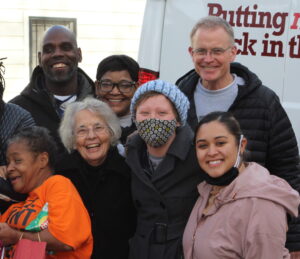
Current PBV, Raechel Kiesel (masked), with other members of the PBMR community
In early November I attended the Ignatian Family Teach-in For Justice, which is hosted by the Ignatian Solidarity Network. One of the speakers, Father Greg Boyle, S.J., founder of Homeboy Industries, a gang intervention program in Los Angeles, spoke about our call to practice kinship. In his talk he kept coming back to a note that we all share the same last name. The last name “being.” He continued, “we are all born the same way. Everyone is unshakably good. Everyone belongs to each other.”
The message from Father Greg has been echoing in my prayers and my mind over the last few weeks. We all belong to each other. We are all in God’s family. We are all made in the image and likeness of God, and we are “unshakably good.” This is all true, but do we actually believe it?
Sometimes it’s hard to see that in the middle of a growing catastrophe of human-caused global climate change, violence that tears the fabric of our communities, the northern hemispheric (and largely white-centric) economic system that leaves billions of folks behind because of where they were born or the color of their skin, and so many other evils in our world.
As I was lost in the despair of so much that is wrong in the world, I kept coming back to his encouragement that we are about “obliterating the illusion that we are separate, we are human beings.” His further instruction that we should not “settle for just shaking your fist, roll up your sleeves to create the place where we cherish each other with every breath.” The challenge is to live up to the belief that we are all connected and then point the way to God’s inclusive love.

Current PBV, Vincent Tedford, in Chicago
When I meet with our volunteers, I see them rolling up their sleeves and being part of creating places where all people are cherished. They are in places where they are better able to recognize their family members who share the same last name of “being” and are children of our loving Creator. I am amazed when I talk to them about what they see and experience with the folks they work and walk with. Instead of just shaking their fists they continue to do the hard work of building a better and more just world. They choose to live out a spirituality of the blood, a spirituality Father Robert Schreiter, C.PP.S. described as a spirituality that “proclaims life in a world where death seems to have the upper hand.”
On a daily basis our volunteers witness the toll that structures which uphold white supremacy and racism takes on the folks they walk with in their placements. It would be easy for our volunteers to point out and shake their fists at these injustices. I know I find myself often shaking my fists at these injustices, and not pointing the way to life. Oftentimes most of us take the easy path of ignoring our own participation in these systems. The hard work of rolling up our sleeves requires us to take a good hard look at our own participation in these structures and commit to breaking them down and building up places where all people are cherished.
We are continuing on with our commitment to the charism of the Precious Blood by making sure we are a welcoming and inclusive community that reflects our charism of reconciliation. Over the next few months we are expanding an effort to examine how the Precious Blood Volunteers Program can proclaim life in this world through being a more racially just program and working for the liberation of all God’s people.

Current PBV, Aaron Wise, at work at KC CARE Health Center
This process will include making sure we are a welcoming and inclusive community that reflects our charism of reconciliation and renewal. It requires some deep questions about how we support our volunteers and alumni of color. In this process we will be looking at how our recruiting practices may unnecessarily exclude people of color. This includes examining how we portray our volunteers and the people they serve in our brochures and website, as well as how we talk about our ministry at recruiting fairs and from where we recruit our volunteers.
We are looking beyond just our own practices to challenge our volunteers and placements to be pointing towards this way of being together as one family. We will engage with our placements to make sure they are working towards a more just future in their hiring practices, their support of their staff, how they treat the people they serve, and who is leading their organizations. We want to be sure that our volunteers are working for reconciliation, where the lives of the folks they work and walk with are valued. Our volunteers should be using this year as an opportunity to bind up their own liberation with the liberation of the people they work with.
In our discernment process and throughout their volunteer year we will need to see how we can better help our volunteers discern their purpose as a way to glorify God through their work and relationships with others.
You can watch Father Boyle’s talk at https://www.youtube.com/user/IgnatianSolidarity along with other videos from the 2021 Ignatian Family Teach-In for Justice.
Tim Deveney is director of Precious Blood Volunteers. You can learn more about Precious Blood Volunteers at preciousbloodvolunteers.org.




 by
by 


